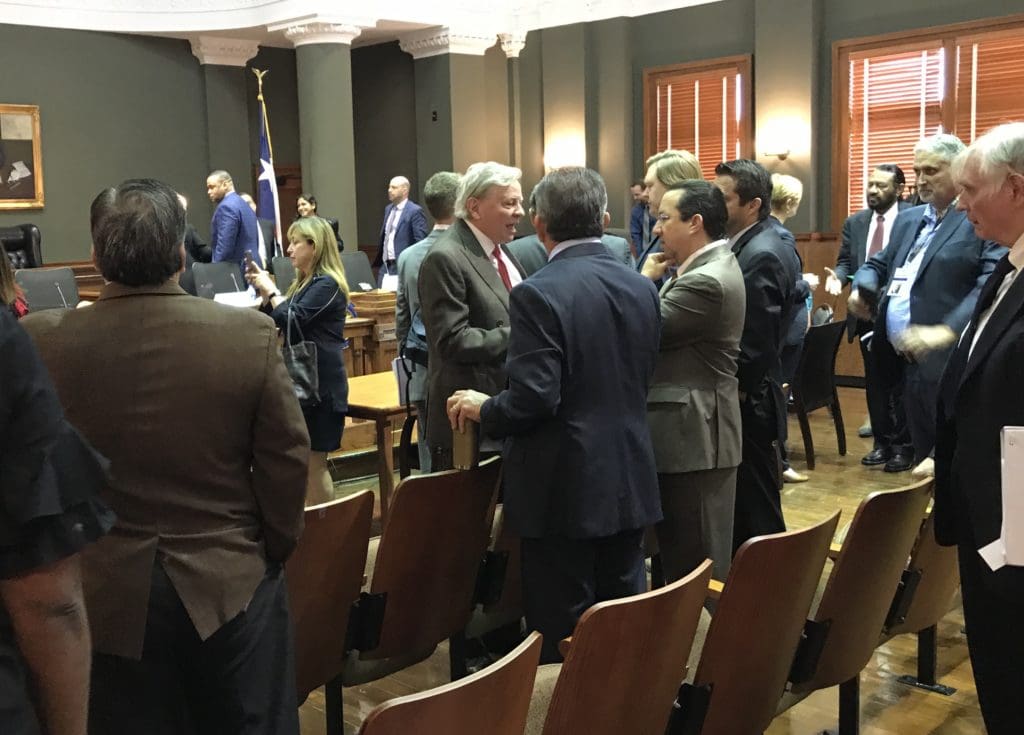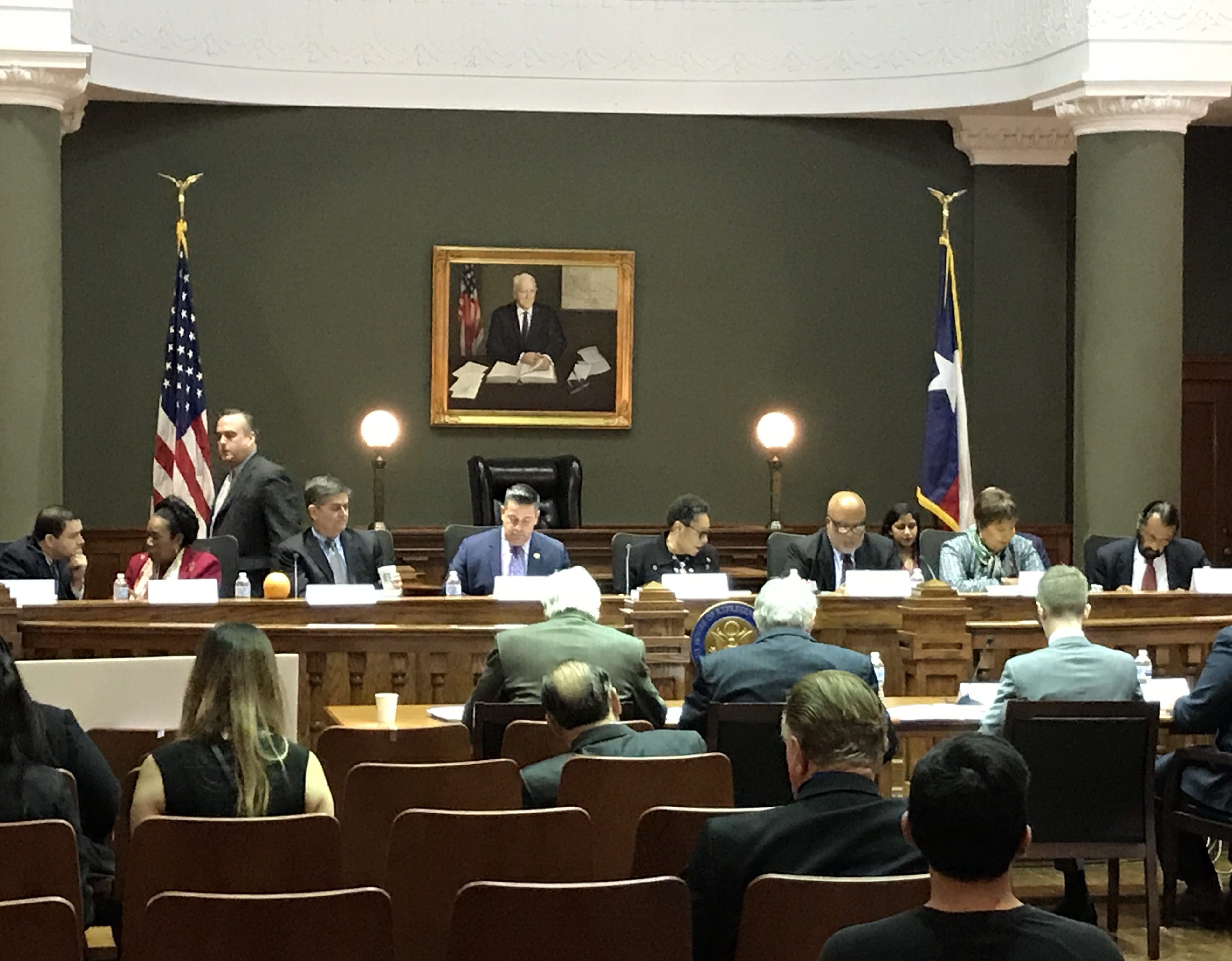In a calculated bid to put Texas elections under federal control, congressional Democrats traveled to Brownsville Monday looking to create a case that the state is so riddled with racial discrimination it can’t be trusted to enact voting laws without approval from Washington.
Democrat members of the Committee on House Administration invited a handful of left-wing lawyers and activists to speak at a “listening session on voting rights and elections,” an event orchestrated to elicit agreement with U.S. Rep. Sheila Jackson Lee of Houston that Texas is “the epicenter of voting discrimination.”
“We need to create a record” of alleged voting rights violations, U.S. Rep. Bennie Thompson of Mississippi told the assembled group.
Jackson Lee and Thompson were joined by fellow members of the Congressional Black Caucus, U.S. Reps. Marcia Fudge of Ohio, Eddie Bernice Johnson of Dallas, Al Green of Houston, and Marc Veasey of Fort Worth; and Congressional Hispanic Caucus members U.S. Reps. Filemon Vela of Brownsville, Henry Cuellar of San Antonio, Vicente Gonzalez of Corpus Christi, and Ben Ray Lujan of New Mexico. Notably absent from the proceedings were any diverse views.
The exhibition was part of a broader effort by Democrats to revive an outdated provision of the Voting Rights Act and mandate California-style voting laws nationwide.
Democrats are hoping to resuscitate Section 5 of the VRA and use it to force Texas and other states into a burdensome process known as preclearance. Under preclearance, a covered jurisdiction (city, county, school district, or entire state) must get federal permission to change any of its election laws or voting-related rules – down to the location of a polling place or an update to a form.
Section 5 preclearance was intended as a temporary measure, authorized for only five years at the time of the VRA’s passage in 1965 and applied only to the most egregious voting rights violators. Republican presidents signed congressional extensions of Section 5 in 1970, 1975 (when Texas became a covered jurisdiction with the addition of language minorities as a protected class), again in 1982, and finally in 2006 for another 25 years.
However, formulas used to determine which jurisdictions were covered under Section 5 weren’t updated, and in its 2013 Shelby v. Holder decision, the U.S. Supreme Court lifted federal preclearance requirements because they were based on decades-old data.
Given the Shelby decision, Jackson Lee asked the panel Monday, what type of record needs to be built that could pressure the current Supreme Court that Section 5 is needed?
 Panelists contended Texas’ history of voting discrimination continues unabated today — that nothing has improved since 1975.
Panelists contended Texas’ history of voting discrimination continues unabated today — that nothing has improved since 1975.
Obstacles faced by minority voters in Texas today are “almost exactly the same” as 45 years ago, said George Korbel, a voting rights attorney who worked on the 1975 case to expand the VRA’s preclearance coverage to Texas.
“We don’t have an immigration problem,” added voting rights attorney Rolando Rios, calling Republican concerns about immigration a “sinister” effort to deny minorities the right to vote, as “70 to 80 percent of new Latino voters voted Democrat.”
“Discrimination in voter registration is persistent and appears to be getting worse,” said Mimi Marziani, president of the Texas Civil Rights Project, claiming the state’s training requirement for deputy registrars and failure to offer online voter registration disproportionately impact minorities. “The people on the rolls in Texas are older and whiter than the citizen voting-age population as a whole,” she added, “so it has skewed the entire political process.”
Complaining about polling place hours during the state’s 12 days of early voting, Jackson Lee prompted Marziani, “You might comment on how horrific that is.” Jackson Lee also speculated that eliminating straight-party voting in Texas “will disenfranchise maybe a million voters.”
Green asked panelists how to “prove our case” that Texas’ voter ID law is a poll tax, after the U.S. 5th Circuit Court of Appeals ruled it is not. Responses focused on costs associated with obtaining a photo ID, even though voters without an ID may simply sign an affidavit at the polls and vote a regular ballot. Democrat attorney Chad Dunn, who represented Veasey in his unsuccessful anti-voter ID lawsuit, said he believes the affidavit is still problematic.
All panelists denied voter fraud is a problem. “I’m not aware of any voter fraud,” Korbel said. “Maybe an election contest where someone may have taken somebody’s ballot,” he added, “but no widespread voter fraud whatsoever.” ACLU of Texas legal consultant Matthew McCarthy characterized recent voter fraud prosecutions as cases of “mistaken understandings.”
“Where there is some legitimate voter fraud is mail-in ballots,” Dunn acknowledged. “But the political perception here in Texas is that white citizens avail themselves of the mail-in ballots [more] than do other citizens of color, so our legislature has chosen to not do anything about that type of voter fraud.” In fact, in the 2017 special session Texas lawmakers enacted Senate Bill 5 specifically to crack down on mail ballot voter fraud.
Vela, whose district includes Brownsville, asked whether it was likely that noncitizens would illegally vote in Texas. “There’s not a lot of incentive to turn out a lot of noncitizens to vote,” Korbel responded, because it wouldn’t be enough to change the outcome of an election.
It actually takes very few illegal votes to change the outcome of an election. In Hidalgo County, a city race decided by just 16 votes was overturned due to voter fraud. Texas Democratic Party chairman Gilberto Hinojosa, a former Cameron County Judge who also attended Monday’s session, defended the guilty party, fellow Democrat Lupe Rivera, in court.
Texas Scorecard has reported extensively on voter fraud cases across the state, including prosecutions in counties represented by every Texas congress member at the session.
Johnson said she was “delighted” Speaker Nancy Pelosi has made voting issues a top priority. Restoring Section 5 preclearance is a small part of federal Democrats’ number one legislative showpiece, House Resolution 1, a grab bag of bad election-related policies previously pushed by the left to strip states of their constitutional authority and impose federal control over state elections.
H.R. 1 includes a progressive wish list of anti-democratic and unconstitutional measures designed to stifle free speech and make elections less secure. Democrats’ design to Californize elections nationwide includes mandates like automatic voter registration (a system plagued with errors in California), same-day registration and voting, at least 15 days of early voting, and no-excuse mail-ballot voting, as well as restrictions on voter roll maintenance (it took a lawsuit to get California to start removing ineligible voters from its rolls) and eliminating photo voter ID requirements.
Monday’s listening session participants endorsed all these measures and portrayed their absence as “proof” Texas deserves to be subject to Section 5 federal preclearance.
Yet despite “weeps in the chamber” Dunn said he witnessed as the Shelby decision was announced, the Voting Rights Act remains robust. Section 3 allows courts to “bail in” specific violators to preclearance (as happened to the City of Pasadena in 2017). And Section 2, the heart of the VRA, is fully intact as a nationwide prohibition against discriminatory voting practices and procedures that deny or abridge the right to vote of any protected class.
Green was right when he said preclearance “paved the way for political inclusion.” But nearly 55 years after that temporary provision was put in place, it’s wrong to claim nothing has changed and federal control of Texas elections is once again called for.
Republicans in Congress should tune out the left’s attempts to intimidate them with smears of racism and instead listen to Democrats’ real endgame: using federal control to block, loosen, or undo states’ voting rules. Texas Republicans should also be listening to their constituents. Texans don’t want their elections Californized, or federalized.
Is Congress is listening to you? Find out how to contact your members of Congress at https://www.congress.gov/members.





